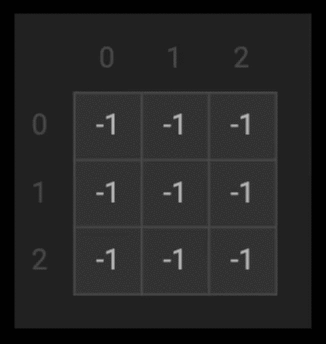Knights Tour Algorithm

Explanation
The Knights Tour Algorithm implements backtracking. Given a square “chessboard” (side length denoted by “size”), the algorithm finds a possible solution where a knight can travel to all parts of the board. Each step is printed from 1 to size squared.
1
2
3
4
5
6
7
8
9
10
11
12
13
14
15
16
17
18
19
20
21
22
23
24
25
26
27
28
29
30
31
32
33
34
35
36
37
38
39
40
41
42
43
44
45
46
47
48
49
50
51
52
53
54
55
56
57
58
59
60
61
62
63
64
65
66
67
68
69
70
71
72
73
74
75
76
77
78
79
80
81
82
83
84
85
86
87
88
89
90
91
92
import javax.swing.text.Position;
import java.nio.file.attribute.PosixFileAttributes;
import java.util.ArrayList;
import java.util.Arrays;
import java.util.List;
class position {
int x;
int y;
position(int xval, int yval) {
x = xval;
y = yval;
}
}
public class KnightTour {
int size = 8;
void print_board(List<List<Integer>> board) {
for (int i = 0; i < board.size(); i++) {
for (int j = 0; j < board.get(i).size(); j++) {
System.out.printf("%d ", board.get(i).get(j));
}
System.out.println();
}
System.out.println();
}
boolean knight(position currentPosition, List<List<Integer>> board, Integer turn) {
if (turn == (size*size) + 1) {
return true;
}
else {
List<String> movelst = new ArrayList<String>
(Arrays.asList("-2, 1", "-1, 2", "1, 2", "2, 1", "2, -1", "1, -2", "-1, -2", "-2, -1"));
for (int i = 0; i < movelst.size(); i++) {
String[] line = movelst.get(i).split(", ");
int addX = Integer.parseInt(line[0]);
int addY = Integer.parseInt(line[1]);
position newpos = new position(currentPosition.x + addX, currentPosition.y + addY);
if (newpos.x < size && newpos.x >= 0 && newpos.y < size && newpos.y >= 0
&& board.get(newpos.x).get(newpos.y) == 0) {
// currently valid possibility
// push
board.get(newpos.x).set(newpos.y, turn);
// recurse
if (knight(newpos, board, turn + 1)) {
return true;
}
// pop
// System.out.print(board);
board.get(newpos.x).set(newpos.y, 0);
}
}
}
return false;
}
public static void main (String args[]) {
KnightTour knightTour = new KnightTour();
List<List<Integer>> board = new ArrayList<List<Integer>>(knightTour.size);
for (int i = 0; i < knightTour.size; i++) {
List<Integer> lst = new ArrayList<Integer>(knightTour.size);
for (int j = 0; j < knightTour.size; j++) {
lst.add(0);
}
board.add(lst);
}
position current = new position(0, 0);
List<position> path = new ArrayList<position>();
board.get(0).set(0, 1);
boolean possible = knightTour.knight(current, board, 2);
if (possible) {
knightTour.print_board(board);
}
else {
System.out.println("No Solution");
}
}
}